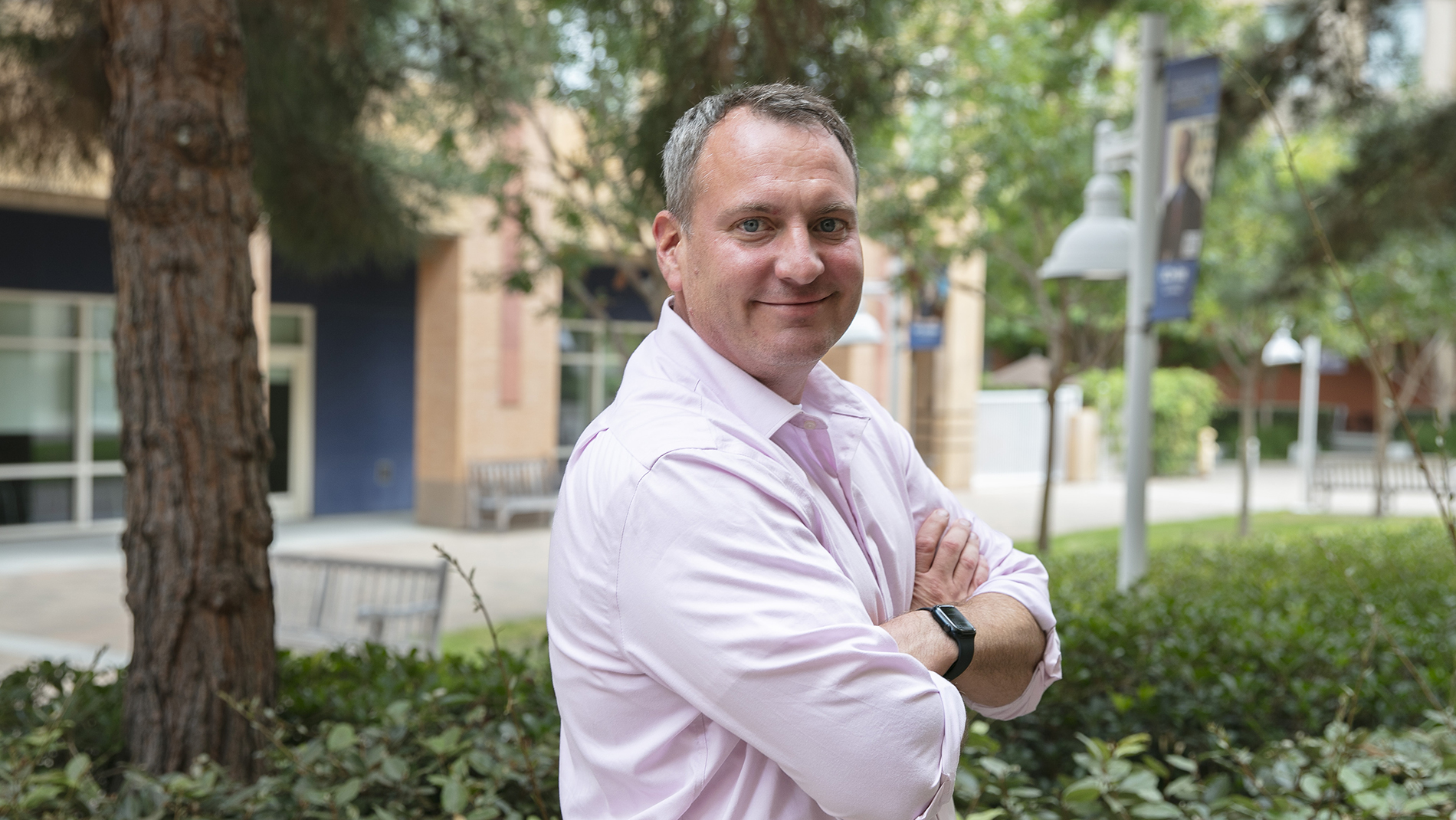
Wage inequality, growth engines and the green economy drive Bill Lester’s research
Despite having 15 years under his belt as a university professor, Bill Lester had butterflies in his belly when he recently headed into his first class as a UC Irvine associate professor of urban planning & public policy.
“It was the largest lecture class I’ve had at 110 [students],” Lester says of Urban Inequality/UPPP 102. “I had been preparing and prepping for this new course, and it really filled up a lot of my time making new lectures. So, I actually felt a little bit like it was the first day of school. I was a bit nervous, but as soon as I got back in the classroom and just had that face-to-face interaction with students, I just went right back into professor mode.”
He adds that “I think the lecture went well” … except for one quieting moment.
“My one dad joke landed terribly,” Lester confides. “The students didn't laugh at the joke, and then they laughed at me making fun of myself.”
Upon further investigation, it was revealed Lester heard the joke during his first day of Econ 101 at the University of Pennsylvania in Fall 1995. We won’t keep you in suspense any longer:
Three professors are stranded on a deserted island with nothing but a can of tuna to eat but no way to open it. There’s a physicist, a chemist and an economist. The physicist calculates the angles and forces required to throw the can at a rock and open the can. The other two ridicule this idea. Then, the chemist says, “I've got it. I can make a rudimentary bomb from bird guano and other materials and open the can.” Same problem. The tuna goes everywhere. ... Then, after much time, the economist says, "This is it!!! Why don't we just ASSUME we have a can opener!!!”
Cue the crickets … or think of it as solid evidence that TikTok renders today’s Anteaters laughed out. Either way, it’s the students who helped draw Lester to UC Irvine in the first place. He began his career as a professor in 2010 at the University of North Carolina, Chapel Hill, where he spent 10 years before moving to California State University, San Jose.
“I really enjoyed working at both of those places, particularly San Jose State where a great proportion of students are coming from families where they’re the first generation in their family to go to college,” Lester says. “So, that was really a great student body to work with, and if you’re someone like me who’s interested in income inequality and economic mobility, working at a Cal State was great.”
He considers UC Irvine “the best of both worlds” he experienced in Chapel Hill and San Jose.
“It’s a famous world-class research institution, so it’s an R1 research institution, which was very attractive to me,” Lester says of UC Irvine. “But it also has a similar profile of students” as San Jose State. Citing the latest figures that show 37% of Anteater undergrads are eligible for Pell grants, which the federal government awards based on need, he remarked, “That’s exciting for me. From a teaching perspective, there’s a big uplift working with amazing students, but also on the research perspective I get to work with doctoral students again, which is great. And, being in the University of California system is just a pleasure.”
He considers his research focus “broad within planning, but it generally focuses on inequality at the metropolitan scale. What I mean by that is I study direct policies that are meant to impact income inequality, such as the living wage and minimum wage laws, and evaluate the impact that they have on both employment as well as local business climates at the city level.”
Lester also evaluates place-based tools that some cities use to try to regenerate growth in distressed neighborhoods, such as tax and financing districts or opportunity zones, and he examines growth that occurs through the green economy. He finds it “exciting” that he will now be conducting his research with his UC Irvine colleagues and graduate students.
“When I think about the School of Social Ecology, I think we’re an ecosystem of scholars here,” he says. “We have lots of different people of different disciplines, and we’re working together and collaborating.”
A solid chunk of Lester’s academic career has been spent on the West Coast. Besides his time at San Jose State, he earned his doctorate in city and regional planning at UC Berkeley and remained there as a post-doctoral scholar at the Institute for Research on Labor and Employment before departing for North Carolina.
However, the native Chicagoan informs that the Windy City inspires much of his research, and he mentions that he’s working on a book based on the Hyde Park/Kenwood neighborhood he grew up in.
Many of Lester’s family members have end grain cutting boards in their homes because of the woodworking hobby Lester took up during the pandemic. “When I'm not working with data, I like to work with my hands,” he says.
And when he’s not working with data or his hands, he genuinely cherishes working with students – as he rediscovered facing the large crowd gathered for that first Urban Inequality class. “It's really a pleasure to be back in the classroom and just see all the bright faces and students eager to learn.”
— Matt Coker
Photo by Han Parker